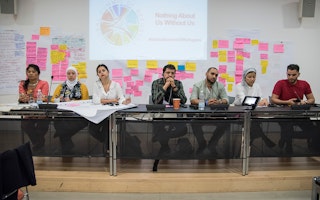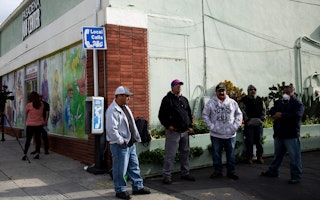What role can art play in broadening perceptions about migration? How can working at the intersection of migration, public space, and the arts drive change? Firelei Baez, Tania El Khoury, Guadalupe Maravilla, and Nontsikelelo Mutiti are some of the visionary artists and cultural producers in the 2019 Soros Arts Fellowship, whose projects tackle these questions in creative and illuminating ways.
The evening will open with a reception to celebrate the launch of the 2019 cohort. Baez, El Khoury, Maravilla, and Mutiti will then present their work, followed by a conversation that engages the diverse artistic approaches to migration and public space in their practices—from pathways of community building through healing and storytelling to the exploration and recovery of diasporic practices and historical narratives.
Now in its second year, the Soros Arts Fellowship builds on the Open Society Foundations and its founder George Soros’s long-term commitment to supporting arts and culture in both closing and opening societies. More about the 2019 Soros Arts Fellows and their projects can be seen here.
Speakers
-
Rashida Bumbray
Moderator
Rashida Bumbray is the senior program manager of the Open Society Arts Exchange.
-
Firelei Báez
Speaker
Firelei Báez is a painter and sculptor whose work negotiates identity and subjectivity in relationship to cultural and regional histories.
-
Tania El Khoury
Speaker
Tania El Khoury is a live artist whose work focuses on audience interactivity and the ethical and political potential of such encounters.
-
Guadalupe Maravilla
Speaker
Guadalupe Maravilla is an artist and educator who creates performances, sculptures, and drawings that blend ancestry, personal mythology, and autobiography.
-
Nontsikelelo Mutiti
Speaker
Nontsikelelo Mutiti is an artist, designer, and educator invested in elevating the work and practices of Black peoples’ past, present, and future.
Read more
Refugee Leadership
Rising from the Ashes of Adversity

A UN advocate for refugee rights is forced by violence to seek refuge herself. How that experience helped build a vibrant global refugee group—and how funders can help refugees overcome barriers to success.
Finding Hope in Diaspora
“Cry, Scream, But Be Strong”: Stories of Afghans in Exile

Afghan Voices of Hope has spent the two years since the Taliban retook control of Kabul capturing the rage, helplessness, and hope of those displaced and struggling to survive as refugees. These are their stories.
A Nation of Immigrants
What the U.S. Still Owes Undocumented Workers

In the United States today, “essential” workers are more likely to be immigrants, and many of them are undocumented. Given all that these people have risked to keep society afloat, they deserve far more support.